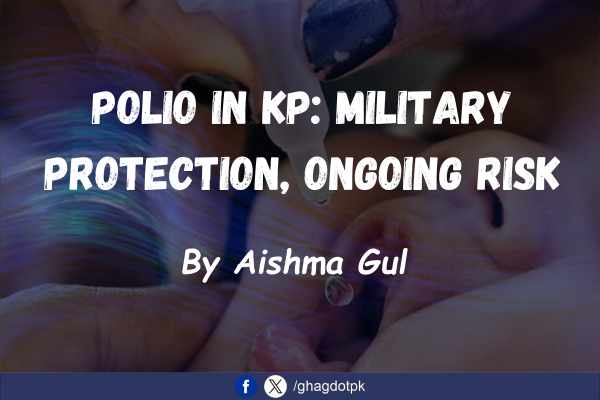By Aishma Gul
‘The greatest wealth is health,’ ancient Roman poet Virgil once said. This timeless wisdom resonates deeply in the quest to eradicate polio, a highly contagious viral disease that primarily affects young children. Polio, or poliomyelitis, is a crippling and potentially fatal illness that has plagued humanity for centuries. The wild poliovirus type 1 (WPV1) is the variant currently present in Pakistan, one of only two countries—along with Afghanistan—where polio remains endemic.
Latest Incident of Violence
Earlier this week, a police officer and a polio worker were martyred in a tragic attack in Bajaur district, Khyber Pakhtunkhwa. Officer Usman, 33, and polio worker Abu Hurairah, 25, were ambushed while administering vaccines as part of Pakistan’s nationwide 7-day anti-polio campaign. This campaign aims to vaccinate 30 million children across the country, with over 286,000 polio workers participating. Despite such efforts, this incident highlights the extreme challenges these workers face, with the attackers fleeing the scene, leaving behind a grim reminder of the risks involved in polio eradication.
Ongoing Boycotts and Public Discontent
Currently, tribal areas such as Bajaur, Mohmand, and Kohat are experiencing boycotts against the polio campaign. Local tribes have refused to allow polio teams to administer vaccines until their demands are met, including the completion of delayed road projects and the rebuilding of demolished schools. Specifically, the Lowi Sam-Anbar road and Warsak-Nazar Mena road in Bajaur, along with the Khapakh border highway and Ambar to Ekkaghund road in Mohmand, have remained incomplete for years. Moreover, a primary school in Boraka (Kohat) was demolished five years ago but has not been rebuilt, further fueling the protests.
Polio Situation in Khyber Pakhtunkhwa
Khyber Pakhtunkhwa (KP) remains a hotspot for polio transmission in Pakistan, and the region has faced significant challenges. Over 20,000 children remained unvaccinated during recent polio campaigns due to parental refusals, with some communities making fresh demands for services like electricity, water, and compensation in exchange for cooperation with vaccination efforts. Misinformation and misconceptions are rampant, with many parents falsely believing that the polio vaccine causes infertility or that vaccination is disallowed in Islam before a disease occurs.
Historical Context: Attacks on Polio Workers
The situation in KP is compounded by a long history of violence against polio workers. Since 2012, 113 people involved in polio eradication campaigns have been killed, including police officers guarding the vaccinators. An additional 165 individuals have been injured during these attacks. Polio workers continue to face life-threatening risks, particularly in districts such as Khyber, Kurram, Lakki Marwat, North Waziristan, and Bajaur. The targeting of these health workers has significantly impacted vaccination campaigns, delaying Pakistan’s polio eradication goal.
Military’s Role in Polio Eradication
The Pakistan Army has played a crucial role in the country’s polio eradication efforts, particularly through security operations like Zarb-e-Azb and Radd-ul-Fasaad. These military campaigns targeted terrorist strongholds in regions such as North Waziristan and Khyber Pakhtunkhwa, areas that were once inaccessible to polio workers due to militant threats. By clearing these regions of insurgents and restoring state control, the Army enabled vaccination teams to safely reach vulnerable populations.
Building on this progress, the military has continued to provide critical support for polio eradication. In 2020, a special security program was launched during a nationwide anti-polio campaign, resulting in the successful vaccination of over 39 million children across the country. A significant number of these vaccinations took place in Khyber Pakhtunkhwa, where military protection ensured the safety of polio workers. The efforts have been particularly notable in volatile regions like North Waziristan and Bannu, where military escorts and checkposts have guaranteed the secure delivery of vaccines.
Global Comparisons: Cooperation vs. Resistance
It is important to note that while nations across the globe rally behind vaccination campaigns to curb disease outbreaks, some communities in KP resist these initiatives by placing secondary demands during polio drives. This not only delays the eradication of polio but also jeopardizes Pakistan’s global standing in health. With only two countries, Pakistan and Afghanistan, still reporting polio cases, such resistance hinders international efforts to eliminate the disease worldwide.
Conclusion and Recommendations
The military’s unwavering efforts in safeguarding polio workers have been commendable, but more needs to be done on a social and political level. Community leaders and health officials must work together to dispel myths surrounding the vaccine, and ongoing dialogue between district administrations and tribal representatives is critical. By prioritizing children’s health and cooperating with polio workers, the people of Khyber Pakhtunkhwa can play a pivotal role in finally eradicating polio from the region. Pakistan stands at a critical juncture in its fight against polio. The military, along with health workers, has made significant strides, but the ultimate success lies in community cooperation and public awareness. Only by working together can the dream of a polio-free Pakistan be realized.






